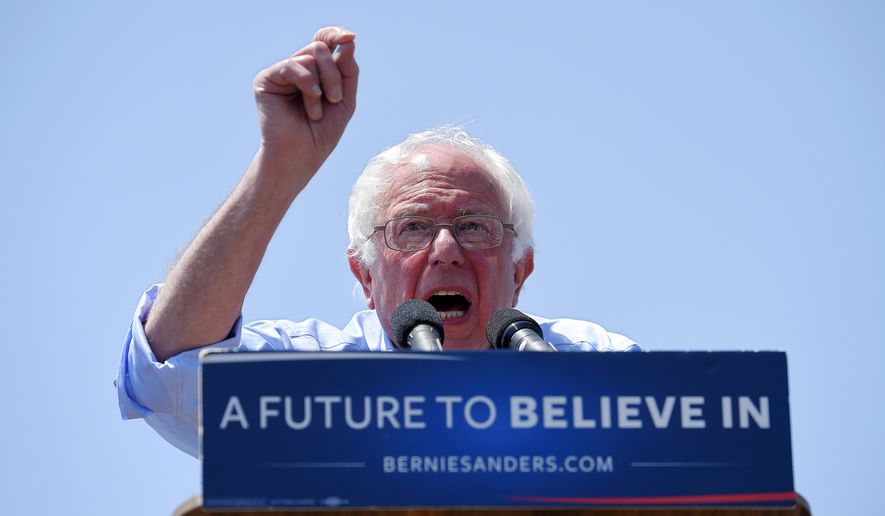ANALYSIS/OPINION:
Bernard Sanders’ appeal among young people has focused on the supposed benefits a socialist society can give them: free education, free health care and a government-mandated “living wage.” But his vision for a socialist utopia flies in the face of reason — and the sad saga of socialism in Europe.
Mr. Sanders’ latest missive accusing Sen. Mitch McConnell of denying pensions to coal miners in Kentucky, West Virginia and Pennsylvania typifies a fervent belief that the government can cure all ills. The coal industry has been hit hard over recent years — in particular because of the shift to cheap natural gas, but also, because of increasingly onerous government regulations that raise the cost of production. As a consequence several large producers are now threatened with bankruptcy and restructuring. A bipartisan bill was floated in Congress to let the federal government step in and fund the miners’ pensions in situations in which the companies go out of business.
In recent speeches Mr. Sanders has also called for increasing the minimum wage, making college free and criticizing the fact that student loan costs exceed cost for other types of credit. “It makes no sense that students and their parents pay higher interest rates for college than they pay for car loans or housing mortgages,” he tweeted recently.
But the people who actually price credit and measure risk in lending might beg to differ. There are all sorts of reasons that student loans might be more expensive than car loans or mortgages. Chief among them is the fact that student loans are often given to individuals with no assets, income or productive capacity. Although the hope is that a student will eventually graduate from college, get a job and repay the loan — there is really no guarantee. And in the absence of some sort of asset to use as collateral, the costs of default to the lender would be high. This risk gets baked into the interest rates charged for such loans.
As part of his campaign platform on education, Mr. Sanders proposes that all state college education be tuition-free. He points to countries like Germany and Chile as having made public education free, but fails to mention the sky-high taxes that make such a deal possible. These proposals are designed to appeal to young people because at the end of the day they won’t be the ones paying for the supposedly free lunch.
SEE ALSO: Bernie Sanders says ‘dumb’ primary process is hurting his Democratic presidential campaign
This kind of government wealth transfer is exactly the opposite of what the country needs at this point. While funding college for able-bodied students might be nice, the government is already deeply in debt to existing unfunded liabilities to seniors. If there is to be any tax transfer this is where it should be going — to those who are too sick or too old to work.
Europe has been stung by its blank-check socialism and is quickly retreating from the welfare state policies of the last century or so. Countries like Greece and Portugal are practically on the verge of economic collapse, facing massive unemployment and — ironically — the very problems that socialism was supposed to solve. Pensions have been cut, and people are being put out on the street.
The social welfare system in France, which leads the world in spending an incredible 32 percent of its GDP on social programs, has become totally unsustainable. When old-age pensions were introduced there, workers outnumber retirees by almost seven to one. Now there are more people on welfare than actually working. Businesses have left France en masse, and many of the wealthiest members of society have sent most of their assets overseas, placing a greater burden on a shrinking tax base.
Even more insidiously, socialist countries have so disincentivized entrepreneurship and work. Young people rightly calculate that in many cases it is more beneficial to live off the state than become economically productive.
America could soon follow suit if people buy into Mr. Sanders’ socialist vision. America already spends 20 percent of GDP on government benefits. We already have a regulatory environment that constrains business development, saddling young vulnerable enterprises with costs that make them almost unsustainable. Rural America in particular is suffering from a dearth of small business development, as only large, politically powerful enterprises are capable of thriving in such environments.
All of this works perversely against the very workers and people Mr. Sanders purports to want to help. Corporate consolidation driven by regulation and cost minimization has a direct impact on driving down workers’ salaries and benefits. And it is too late, once an industry has been regulated into oblivion, to try to save the workers’ pensions. Government does not have all the answers, and neither does Bernard Sanders.
SEE ALSO: Libertarians nominate Gary Johnson for president on second ballot
• Armstrong Williams is a nationally syndicated columnist and sole owner/manager of Howard Stirk Holdings LLC TV.
• Armstrong Williams can be reached at 125939@example.com.




Please read our comment policy before commenting.